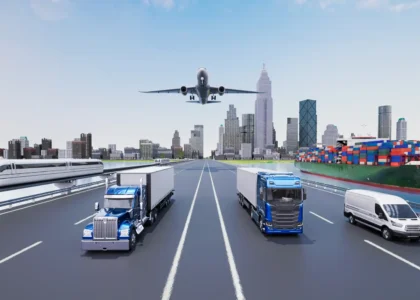The logistics industry is undergoing a profound transformation. New technologies like Artificial Intelligence (AI), Blockchain, and the Internet of Things (IoT) are reshaping traditional supply chain management methods. These innovations help businesses increase efficiency, reduce costs, and improve product traceability. In this article, we explore in detail how these technologies are revolutionizing the sector and the advantages of integrating them into the supply chain.
Key Concepts Explained (AI, Blockchain, IoT)
- Artificial Intelligence (AI): AI refers to technologies that simulate human intelligence, such as machine learning and predictive analytics. In logistics, AI helps optimize demand forecasting, improve inventory management, and plan delivery routes.
- Blockchain: Blockchain is a decentralized data storage and transmission technology. Applied to logistics, it ensures product traceability throughout the supply chain, offering complete transparency for businesses and their customers.
- Internet of Things (IoT): IoT involves connecting physical objects to the internet to collect and exchange data. In supply chains, IoT sensors track shipments in real time, monitor transport conditions (temperature, humidity), and prevent delays or incidents.
Real-World Applications of These Technologies in Logistics
- AI Demand Forecasting: Companies use machine learning algorithms to analyze past sales data and predict future demand. This enables better inventory management, avoiding costly stockouts or excess inventory.
- Real-Time Shipment Tracking with IoT: IoT sensors like GPS tags and temperature trackers allow businesses to monitor every step of a shipment’s journey. This provides greater visibility and offers customers a more transparent and reliable delivery experience.
- Product Traceability via Blockchain: For industries requiring strict traceability (such as food and pharmaceuticals), blockchain provides a reliable solution. It enables tracking each step of production and distribution, providing immutable proof of product quality and origin.
Benefits for Businesses: Cost Reduction, Efficiency Gains, and Better Supply Chain Visibility
- Cost Reduction: AI-driven route optimization and automated inventory management reduce logistics costs. Additionally, IoT-based predictive maintenance reduces equipment failure risks and repair costs.
- Efficiency Gains: Real-time synchronization of data via IoT and blockchain reduces delivery times and improves coordination among supply chain players. Businesses can better manage demand fluctuations and respond swiftly to unexpected events.
- Better Supply Chain Visibility: The transparency provided by blockchain and real-time IoT data gives a comprehensive view of the logistics chain. This enhances decision-making and builds trust with partners and customers.
Challenges and Future Outlook
- Data Security: Integrating AI, blockchain, and IoT requires careful attention to data security. Companies must ensure the protection of sensitive information and guard against cyber threats.
- Implementation Costs: While these technologies offer great potential, their implementation requires a significant upfront investment. Businesses must assess the return on investment before adopting these solutions.
- Team Training: Adopting new technologies also means training teams to use them effectively. This requires time and resources but is essential for a successful transition to Logistics 4.0.
Future Outlook: The Rise of Logistics 4.0
Logistics 4.0 is rapidly gaining momentum, and technologies like AI, blockchain, and IoT will continue to evolve. As their adoption becomes widespread, we will see a supply chain that is more connected, transparent, and responsive, giving businesses a competitive edge.
Logistics 4.0 represents a game-changing revolution for companies seeking to remain competitive in the market. By integrating AI, blockchain, and IoT into the supply chain, businesses can reduce costs, improve efficiency, and gain better visibility across their entire supply chain. To learn more about solutions tailored to your business, contact JL Supply Chain and discover how these technologies can transform your logistics management.










